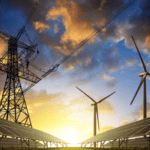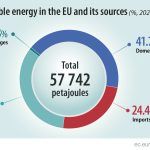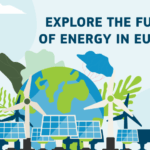
The Council today agreed on its negotiating position on the draft regulation to phase out imports of Russian natural gas. The regulation constitutes a central element of the EU’s REPowerEU roadmap to end dependency on Russian energy, following Russia’s weaponisation of gas supplies and repeated disruptions of gas supplies to the EU with significant effects on the European energy market.
The proposed regulation introduces a legally binding, stepwise prohibition on both pipeline gas and liquefied natural gas (LNG) imports from Russia, with a full ban to apply from 1 January 2028. The Council agreement maintains this deadline, and therefore represents an ambitious signal of willingness to deliver on the phase out. It will contribute to the overarching goal of achieving a resilient and independent EU energy market, while preserving the EU’s security of supply.
An energy independent Europe is a stronger and more secure Europe. Although we have worked hard and pushed to get Russian gas and oil out of Europe in recent years, we are not there yet. Therefore, it is crucial that the Danish Presidency has secured an overwhelming support from Europe’s energy ministers for the legislation that will definitively ban Russian gas from coming into the EU.
Lars Aagaard, Minister for climate, energy and utilities of Denmark
Main changes agreed by the Council
Transition phase for existing supply contracts
The Council confirmed that imports of Russian gas will be prohibited from 1 January 2026, while maintaining a transition period for existing contracts. In particular, short-term contracts concluded before 17 June 2025 may continue until 17 June 2026, whereas long-term contracts may run until 1 January 2028.
Amendments to existing contracts will be permitted only for narrowly defined operational purposes and cannot lead to increased volumes. , except for some specific flexibilities for landlocked member states affected by recent changes in supply routes.
Customs procedures and authorisation
Compared to the Commission’s proposal, the Council has streamlined customs obligations by establishing lighter documentation requirements and procedures for imports of non-Russian gas. In such cases, only must be provided to the authorising authorities before gas enters the EU’s customs territory, while more information is requested for gas imports from Russia during the transitional phase (including the date and duration of the supply contract, the quantities contracted and any amendments to the contract).
The Council included the requirement that both categories of gas imports be subject to a prior authorisation regime in order to ensure that the prohibition will work in practice:
- for Russian gas and those imports falling under the transition period, the information required for authorisation must be submitted at least one month before entry
- for non-Russian gas, the proof must be provided at least five days before entry
- in the case of mixed LNG cargos, the documentation must prove the respective shares of Russian and non-Russian gas in the mixture, with only the non-Russian amounts being allowed to enter the EU
In order to reduce the administrative burden, member states agreed that this prior authorisation procedure would not apply to imports from countries fulfilling a list of criteria outlined in the proposed regulation. This ensures that only the imports that are most relevant to check will be subject to prior authorisation. According to the agreed text, the Council tasks the Commission with drawing up the list of exempted countries within five days of the entry into force of the regulation.
Additional monitoring and notification mechanisms have also been introduced to prevent Russian gas from entering the EU under transit procedures (i.e. gas passing through the EU on its way to another destination, without entering the EU market).
National diversification plans
The proposed regulation requires all member states to submit national diversification plans outlining measures and potential challenges to diversifying their gas supplies. The Council has agreed to exempt those member states that can demonstrate that they no longer receive any direct or indirect imports of Russian gas.
The same requirement to submit a national diversification plan will apply to those member states that are still importing Russian oil, with a view to discontinuing those imports by 1 January 2028.
Other elements
Compared to the Commission’s proposal, the Council further developed provisions on information exchange between national authorities, the EU Agency for the cooperation of energy regulators (ACER) and the Commission, and required the Commission to review the implementation of the regulation within two years of its entry into force, including the provisions on the prior authorisation procedures.
It also clarified the suspension clause, specifying which types of disruption to the security of supply could justify a temporary lifting of the import prohibition or of the prior authorisation requirement.
Next steps
The Council presidency will start negotiations with the European Parliament with a view to agreeing on the final text of the regulation, once the latter has adopted its position.
Background
Following Russia’s war of aggression against Ukraine, EU leaders agreed, in the Versailles Declaration of March 2022, to phase out dependency on Russian fossil fuels as soon as possible.
As a consequence,gas and oil imports from Russia to the EU have both decreased significantly in recent years. However, while imports of oil have dropped to below 3% in 2025, Russian gas still accounts for an estimated 13% of EU imports in 2025, worth over €15 billion annually. This leaves the EU exposed to significant risks in terms of its trade and energy security.
In order to address this vulnerability, in May 2025, the Commission adopted the REPowerEU roadmap to ensure a stepwise approach to the phasing out of the remaining Russian energy imports and to boost the EU’s energy independence and security.
In June 2025 the Commission put forward a proposal focusing on a gradual phasing out of the remaining pipeline gas and LNG, with a full prohibition by 1 January 2028.
More information: European Council






Leave a Reply